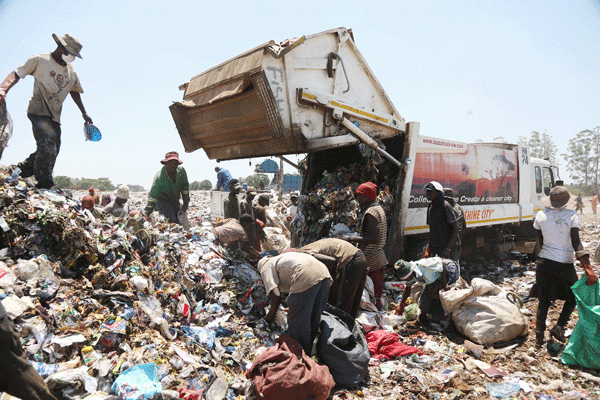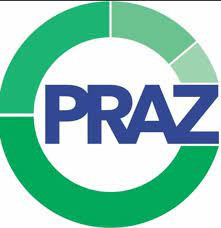
IN the global push for sustainable development, arguably, waste recycling is gaining significant recognition.
Despite this drive, Zimbabwe’s cities, towns and urban communities, with all the waste glaringly lying around in uncollected heaps and dumps, one hardly sees this venture gaining any foothold in terms of uptake and growth.
Large volumes of waste, now a sprawling eyesore, deeply marks these “dumping zones” as more than synonyms for pollution!
What more, with monthly government-promoted clean up campaigns with much less community-involvement, apparently doing nothing to lift up the pall and change societal image.
A sustainable and profitable venture if robust urban waste management policies and practices are diligently crafted, recycling waste remains largely neglected, with waste pickers facing numerous obstacles in their pursuit of sustainable and profitable livelihoods.
Researchers note that the absence of robust urban waste management policies, weak corporate social responsibility practices, and a lack of organised, monitored and inclusive waste management systems are hindering progress.
This opinion piece aims to shed light on the challenges faced by waste pickers, nationally and globally and advocates for transformative measures that can empower them, enhance recycling practices, and contribute to a cleaner and more prosperous Zimbabwe.
In some developed and middle-income countries, urban waste management has become associated with best practice for environmental management, while in developing countries it continues to be a practice of negligence and poverty, with low-income residents making a minimum or insignificant income from the trade.
- Why we fall for disinformation
- Funding for researchers
- Unpacking environmental laws for real estate in Zimbabwe
- Veld fire management strategies for 2022
Keep Reading
In the industrialised countries, waste pickers save city governments money, contribute to cleaner cities and reduce the volume of waste that has to be dumped by up to 20%.
With Zimbabwe’s high unemployment rate, soaring above 80%, according to independent statisticians; effective and efficient urban waste management and recycling policies and practices will create pockets of gainful and viable employment for its citizens.
Throughout Latin America, some of the lowest-income citizens find a living this way, and the diverse names by which recyclers are known reflects their ubiquitousness: Recicladores, cartoneros, pepenadores, cartadores, recuperadores, buzos, gancheros and cirujas. Although waste picking creates value from the waste generated by society, it is rarely treated with respect for the services it provides.
Firstly, waste pickers are typically from the lowest-income segments of society. They engage in waste picking as a means of survival, often facing limited employment opportunities and lacking access to formal education and training.
This socio-economic context further exacerbates their vulnerability and perpetuates their marginalisation.
Secondly, waste pickers are subjected to social exclusion and discrimination. Their work is often undervalued and misunderstood by the general public.
They are viewed through a lens of social stigma, reinforcing negative stereotypes and perceptions.
This lack of recognition and respect leads to a disregard for their rights and well-being.
Additionally, waste pickers operate in hazardous environments without adequate protective measures.
They face health and safety risks due to exposure to toxic substances, sharp objects, and unsanitary conditions.
The physical toll on their bodies and the potential health consequences are often overlooked or ignored.
Moreover, the informal nature of waste picking contributes to the lack of respect and recognition.
The absence of legal frameworks and formalisation of their activities denies waste pickers access to social security, fair wages and benefits.
They are denied the basic rights and protection that formal workers enjoy, leaving them in a vulnerable position.
Furthermore, scholars note that the lack of respect for waste pickers is also reflected in the limited opportunities for their economic and social advancement.
They are rarely provided with avenues for personal and professional development, perpetuating a cycle of poverty and limited prospects.
This further reinforces the perception that waste picking is a low-status occupation.
To address this critical observation, it is essential to challenge prevailing attitudes and promote a shift in societal perceptions.
Recognising the value that waste pickers bring to communities and the environment is crucial.
A comprehensive approach is needed, which includes legal protection, access to social security, improved working conditions and avenues for skills development and economic empowerment.
Furthermore, innovative public awareness campaigns and educational initiatives should be implemented to foster a deeper understanding of the vital role of clean-up campaigns and waste picking in the sustainable waste management agenda.
By promoting respect and appreciation for this work, society begins to dismantle the social stigma surrounding clean-ups and waste picking and contribute to creating more inclusive, innovative and sustainable communities.
Critical observers point out that when analysing public-private partnerships in waste management, like the City of Harare and Pomona dumpsite waste recycling debacle, several factors should be considered:
Transparency and accountability
Assess the transparency of the partnership in terms of the selection process, contract negotiations, and decision-making.
Evaluate whether the venture adheres to ethical standards and ensures accountability in resource allocation, management and project implementation.
Economic viability
Examine the financial aspects of the partnership, including the terms of agreement, cost-sharing mechanisms, revenue distribution and potential economic benefits for all parties involved.
Consider the long-term sustainability of the project and its potential impact on waste management practices and the local economy.
Social and environmental impact
Evaluate the social and environmental implications of the venture.
Assess whether the project contributes to sustainable waste management practices, promotes environmental protection and improves the quality of life for the local community.
Consider the impact on waste pickers and their integration into the formal waste management system.
Local participation and empowerment
Analyse the level of involvement and empowerment of local stakeholders, including waste pickers, community organisations and residents.
Assess whether the partnership promotes inclusivity, local capacity building and the transfer of knowledge and skills to the local workforce.
Regulatory compliance
Ensure that the venture complies with local regulations, environmental standards, and labour laws.
Assess whether the partnership aligns with national waste management policies and goals and if it supports the development of a robust waste management framework.
Long-term vision and sustainability
Consider the long-term vision of the partnership and its potential to evolve into a sustainable waste management system.
Evaluate whether the venture includes plans for continuous improvement, innovation and adaptation to changing circumstances.
Transformation of waste management in Zimbabwe requires a comprehensive and holistic approach that recognises the value of clean-up campaigns, waste picking, policy strengthening and fostering collaboration between various stakeholders.
By empowering waste pickers, developing inclusive recycling practices and establishing organised waste management systems, Zimbabwe can unlock the potential of its waste management and recycling sector.
This will not only contribute to cleaner, healthier and sustainable communities, but also to creating gainful employment opportunities, uplifting marginalised communities and promoting sustainable development.
It is about time Zimbabwe embraces the transformative power of waste management and recycling; harnessing it for the betterment of its citizens and the environment they inhabit.
Tonderayi Matonho is a journalist exploring disability inclusivity, participation, integration and management debate across communities. He can be reached at 263-777 052 658, Email: tmatonho@gmail.com.











